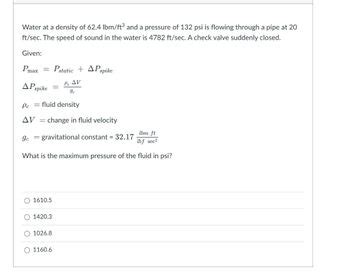

Density of Water: A Comprehensive Guide to 62.4 lbm/ft³
Understanding Density
Density, a measure of mass per unit volume, is a crucial property of any substance. In the case of water, its density is a fundamental characteristic that plays a vital role in numerous scientific, industrial, and everyday applications.

Density of Water in lbm/ft³
The density of water is defined as the mass of water per cubic foot. At standard atmospheric pressure and a temperature of 4°C (39.2°F), the density of water is approximately 62.4 pounds per cubic foot (lbm/ft³). This value is often used as a reference point for other substances and materials.
Why Density Matters
The density of water has a profound impact on various aspects, including:
- Buoyancy: The higher density of water allows objects less dense than it to float, a principle that underpins buoyancy and marine transport.
- Thermal properties: Water’s high density contributes to its high specific heat capacity and thermal conductivity, making it an excellent thermal mass in heating and cooling systems.
- Hydrostatic pressure: The density of water exerts hydrostatic pressure, which is proportional to the depth of the water. This pressure is a factor in dam design, submarine operation, and underwater exploration.
- Environmental impact: The density of water influences aquatic ecosystems, affecting the distribution of organisms and the flow of nutrients.
Applications of Water Density
The unique density of water makes it suitable for a wide range of applications, such as:
- Water filtration: The density difference between water and impurities allows for water purification techniques like sedimentation and filtration.
- Cooling systems: Water’s high specific heat capacity makes it an effective coolant in engines, air conditioners, and industrial processes.
- Hydraulic systems: Water’s density enables it to transmit power and control motion in hydraulic systems, such as brakes and lifts.
- Aquaculture: The density of water is crucial for fish farming, as it determines the amount of dissolved oxygen available to aquatic life.
- Hydropower generation: The density of water is exploited in hydropower dams to convert the potential energy of water into electricity.
Measuring Water Density
The density of water can be measured using various methods, including:
- Hydrometer: A device that measures the specific gravity of a liquid, which can be converted to density.
- Pycnometer: A calibrated glass flask used to determine the density of a liquid by measuring its mass and volume.
- Electronic balance: An accurate electronic balance can measure the mass of a known volume of water, providing a precise density value.
Density of Water at Different Temperatures
The density of water varies slightly with temperature. The following table shows the density of water at different temperatures, as reported by the National Institute of Standards and Technology (NIST):
| Temperature (°C) | Density (lbm/ft³) |
|---|---|
| 0 | 62.42 |
| 4 | 62.43 |
| 10 | 62.41 |
| 20 | 62.37 |
| 30 | 62.31 |
| 40 | 62.24 |
| 50 | 62.16 |
| 60 | 62.06 |
| 70 | 61.95 |
| 80 | 61.82 |
| 90 | 61.67 |
| 100 | 61.49 |
Density of Water in Other Units
The density of water can be expressed in various units, including:
| Unit | Conversion to lbm/ft³ |
|---|---|
| kilograms per cubic meter (kg/m³) | 1 kg/m³ = 0.0624 lbm/ft³ |
| grams per cubic centimeter (g/cm³) | 1 g/cm³ = 62.4 lbm/ft³ |
| pounds per gallon (lb/gal) | 1 lb/gal = 8.34 lbm/ft³ |
FAQs
Q: Why is the density of water important?
A: The density of water affects its buoyancy, thermal properties, hydrostatic pressure, and environmental impact.
Q: How can I measure the density of water?
A: The density of water can be measured using a hydrometer, pycnometer, or electronic balance.
Q: What is the density of water at 25°C?
A: At 25°C, the density of water is approximately 62.36 lbm/ft³.
Q: How does the density of water affect aquatic life?
A: The density of water affects the distribution of organisms and the flow of nutrients in aquatic ecosystems.
Q: What are some unique applications of water density?
A: Water density is used in applications such as water filtration, cooling systems, hydraulic systems, aquaculture, and hydropower generation.
Q: How does temperature affect the density of water?
A: The density of water decreases slightly as temperature increases.
Q: What is the density of water at 100°C?
A: At 100°C, the density of water is approximately 61.49 lbm/ft³.
Q: What is the density of seawater?
A: The density of seawater is typically higher than that of freshwater due to the presence of dissolved salts. The average density of seawater is around 64 lbm/ft³.










